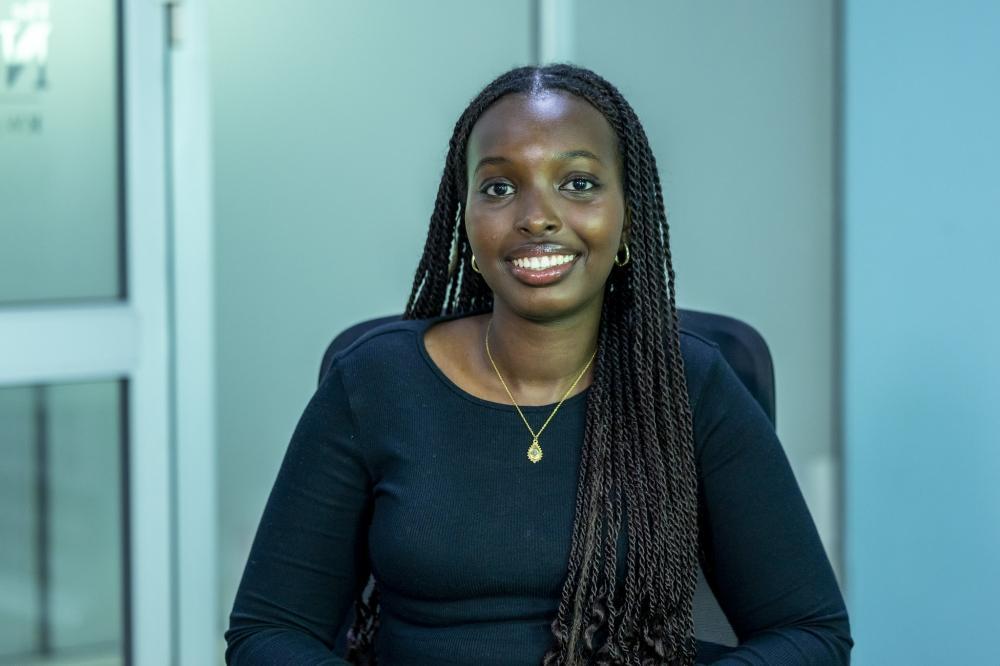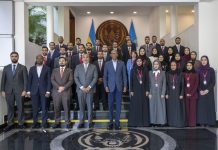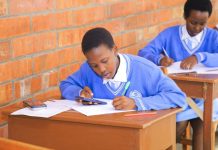Africa-Press – Rwanda. When 16-year-old Cailin Rugema heard her name called in a packed arena in New York, on June 13, she was taking a sip of water. She choked, looked around, and turned to the person next to her. “Did they just say my name?” she asked. They had.
The student from Wellspring Academy, a non-denominational Christian school in Kigali, walked to the podium, proudly carrying Rwanda’s flag to receive a silver medal at Genius Olympiad, an international high school project competition about environmental issues.
The competition brings together high school students from around the world to showcase innovative projects focused on science, technology, and environmental sustainability.
“I stayed up late revising drafts I wasn’t sure were good enough, and my computer crashed just two days before my flight. There were moments I doubted whether I could succeed,” she said.
A dream that grew
Rugema has always been fascinated by the sky. She said, “As a child, I wanted to be an astronaut, then a pilot. Eventually, I found aerospace engineering, something I could pursue, something real.
“Today, I am focused on chemistry and math. They are more than just school subjects to me as they help me understand things like flights, materials, and how to protect the environment. Even when I find science hard, it keeps drawing me back. I don’t feel that way about anything else.”
Her winning project idea was inspired by a blend of her interests; aviation, materials science, and the environment.
She explored how enhanced carbon fiber strengthened polymers, materials already used in aircraft and some cars, could be chemically improved to reduce fuel use and cut emissions.
“The process I focused on is called functionalization. It’s a chemical adjustment that makes the material perform better. In simple terms, lighter, stronger aircraft mean less fuel burned and that means less damage to the planet,” she explained.
‘I screamed’
Rugema applied only days before the deadline, having discovered the competition by chance.
Although she knew little about it at first, the focus on sustainability and science immediately caught her attention.
She submitted everything before March 1, not knowing the deadline would eventually be extended. The process, while intimidating at first, turned out to be manageable, especially for someone willing to commit.
She noted that many people assume such competitions are too challenging or complicated. But with genuine interest and some planning, she believes it’s possible to manage. And even if one isn’t always perfectly organized, it can still work out.
“I got the acceptance email in April, soon after waking up. I was still half-asleep when I saw it. I screamed. My mother thought something had happened. I just ran to her and said, ‘I got in!’ We both cried. It was one of those moments you don’t forget,” the youngster recalled.
I remember thinking, ‘What am I doing here?’
By the time she left Kigali, with her mother, heading to New York, on June 8, Rugema knew she would be the only finalist from Rwanda.
That reality weighed on her. But it also motivated her.
“I was proud but nervous. Being the only person from your country comes with pressure. You want to do well for yourself, but also for everyone back home,” Rugema stated.
The Genius Olympiad took place at the Rochester Institute of Technology in New York, bringing together approximately 1,100 student finalists from over 70 countries who presented around 830 projects.
“When I walked into the exhibition hall, I froze a little. The space was huge. There were projects everywhere. I remember thinking, ‘What am I doing here?’” she said.
Rugema explained that her mother supported her throughout the journey, helping to keep her grounded.
Her mother was positive and believed in her, even when she doubted herself. They rehearsed the presentation 13 times until she was confident.
When presentation day arrived, they were ready.
She explained that each student met four to six judges from various backgrounds. While some judges were experts, others had no scientific experience. This meant she had to present her project in a way that anyone could understand, a challenging task, but one she was prepared for.
Rochester Institute of Technology
The awards ceremony took place two days later.
The contestants sat separately from their families. Rugema sat alone among strangers while her mother watched from the audience. The honourable mentions were announced first but her name was not called. The same followed with the bronze awards. At that moment, she began to lose hope.
Then the silver awards were announced, name after name, until finally, hers was called.
She could hardly believe it. Glancing at her friend and then her mother, she quickly made her way to the stage.
Holding Rwanda’s flag, she smiled through tears, feeling that all the long nights, discarded drafts, and moments of panic, like when her computer crashed, had been worth it.
She received a silver medal, a certificate, and a $18,000 renewable scholarship to Rochester Institute of Technology.
The scholarship only applies if she gets accepted to the university.
Asked about the people who supported her to reach this point, Rugema’s list begins with her family.
Her mother, who stayed up late helping her, kept her focused and never let her give up. Her father, who stepped in with his laptop when hers crashed. And her grandmother who raised a family through hardship and showed her the true meaning of resilience.
“They have endured more than I can imagine, yet they give everything so I can have these opportunities. I owe them everything,” she said.
Inspired by Amelia Earhart
Rugema draws inspiration from Amelia Mary Earhart, an American aviation pioneer she often talked about during middle school.
On July 2, 1937, Earhart disappeared over the Pacific Ocean while attempting to become the first female pilot to circumnavigate the world.
“She did something bold that no one believed women could do at the time. That stayed with me.”
Earhart authored books and dedicated herself to promoting aviation, especially encouraging women to pursue careers in the field.
Message to girls: “If uncertain, follow what sparks your curiosity’
Rugema acknowledged that the journey ahead will be demanding but noted that the sky isn’t the limit. It’s just the beginning.
In Rwanda and across much of Africa, STEM fields continue to see higher enrolment of boys compared to girls. Rugema is determined to change this, not just by telling girls they can succeed, but by showing them that they already are.
She recalls a moment, in eighth grade, when she nearly chose humanities over science not out of genuine interest, but because she believed it would be easier.
“I thought easy meant enjoyable. But even when science was challenging, I realized I still wanted to pursue it. To the girls out there, if you are uncertain, follow what excites you, what sparks your curiosity. Passion will always prevail, even when the path is difficult.”
For More News And Analysis About Rwanda Follow Africa-Press






